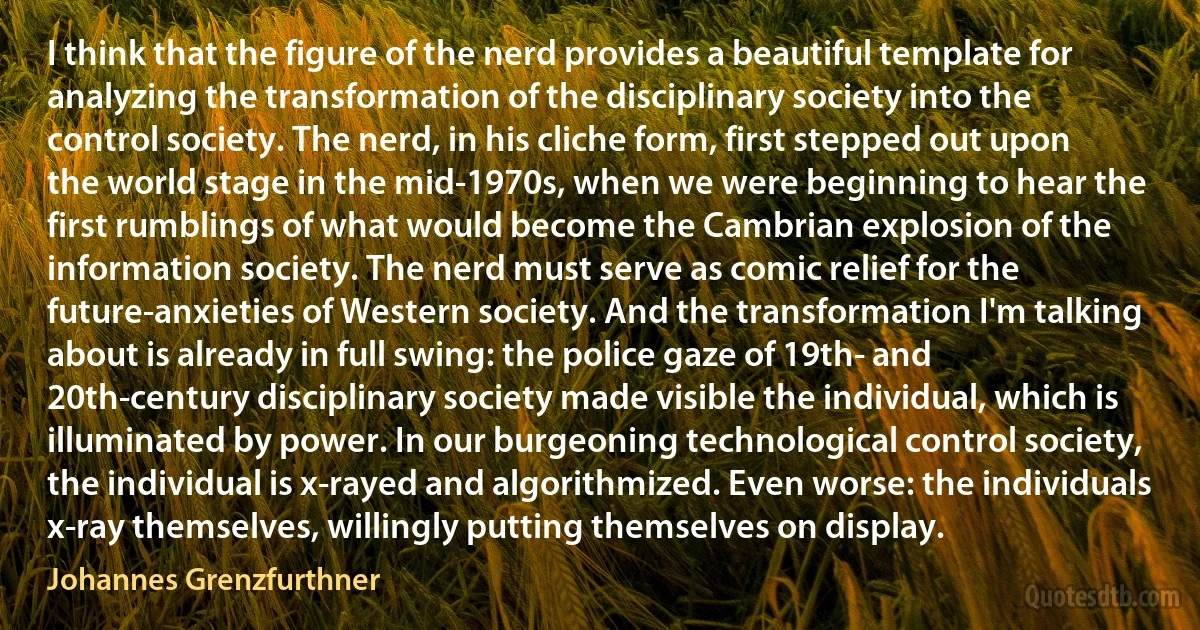
I think that the figure of the nerd provides a beautiful template for analyzing the transformation of the disciplinary society into the control society. The nerd, in his cliche form, first stepped out upon the world stage in the mid-1970s, when we were beginning to hear the first rumblings of what would become the Cambrian explosion of the information society. The nerd must serve as comic relief for the future-anxieties of Western society. And the transformation I'm talking about is already in full swing: the police gaze of 19th- and 20th-century disciplinary society made visible the individual, which is illuminated by power. In our burgeoning technological control society, the individual is x-rayed and algorithmized. Even worse: the individuals x-ray themselves, willingly putting themselves on display.
Johannes GrenzfurthnerRelated topics
beautiful beginning cliche comic control disciplinary form full power putting serve step talking template think transformation western world worse x-ray nerd burgeoningRelated quotes
Bye bye. Look, see? He's smiling. See, he's having a good time. Oh, I love the old days, you know? You know what I hate? There's a guy, totally disruptive, throwing punches, we're not allowed to punch back anymore. I love the old days. You know what they used to do to guys like that when they were in a place like this? They'd be carried out on a stretcher, folks. You know, I love our police, and I really respect our police, and they're not getting enough. They're not. Honestly, I hate to see that. Here's a guy, throwing punches, nasty as hell, screaming at everything else when we're talking, and he's walking out, and we're not allowed -- you know, the guards are very gentle with him, he's walking out, like, big high fives, smiling, laughing -- I'd like to punch him in the face, I'll tell you.

Donald Trump
As the natural sciences have developed to encompass increasingly complex systems, scientific rationality has become ever more statistical, or probabilistic. The deterministic classical mechanics of the enlightenment was revolutionized by the near-equilibrium statistical mechanics of late 19th century atomists, by quantum mechanics in the early 20th century, and by the far-from-equilibrium complexity theorists of the later 20th century. Mathematical neo-Darwinism, information theory, and quantitative social sciences compounded the trend. Forces, objects, and natural types were progressively dissolved into statistical distributions: heterogeneous clouds, entropy deviations, wave functions, gene frequencies, noise-signal ratios and redundancies, dissipative structures, and complex systems at the edge of chaos.

Nick Land
On United Nations International Day in Support of Victims of Torture, the United States reaffirms its commitment to the worldwide elimination of torture. Freedom from torture is an inalienable human right, and we are committed to building a world where human rights are respected and protected by the rule of law...Throughout the world, there are many who have been seeking to have their voices heard, to stand up for their right to freedom, and to break the chains of tyranny. Too many of those courageous women and men are paying a terrible price for their brave acts of dissent. Many have been detained, arrested, thrown in prison, and subjected to torture by regimes that fail to understand that their habits of control will not serve them well in the long-term.

George W. Bush
Justice is the end of government. It is the end of civil society. It ever has been, and ever will be, pursued, until it be obtained, or until liberty be lost in the pursuit. In a society, under the forms of which the stronger faction can readily unite and oppress the weaker, anarchy may as truly be said to reign, as in a state of nature where the weaker individual is not secured against the violence of the stronger: And as in the latter state even the stronger individuals are prompted by the uncertainty of their condition, to submit to a government which may protect the weak, as well as themselves: so in the former state, will the more powerful factions be gradually induced by a like motive, to wish for a government which will protect all parties, the weaker as well as the more powerful.

Alexander Hamilton
Don't forget that God sees you and watches you when you are in pain; He perceives even the beating of your heart. Consequently, He will not leave you without consolation and His fatherly protection. Naturally, the saints rejoiced in their afflictions; as for us, let us at least manage to accept affliction or pain patiently.
My child, pray within your heart, and the name of Jesus will become for you a comforting balm so that you can bear this trial of yours in a way which benefits you. You will greatly benefit from this trial if you submit yourself to it patiently. So again I say to you, with the almighty armor of prayer continually approach the omnipotent Lord more often, and you will come to know how He wondrously lifts the burden of pain and marvellously gives rest to sufferers.

Ephraim of Arizona
